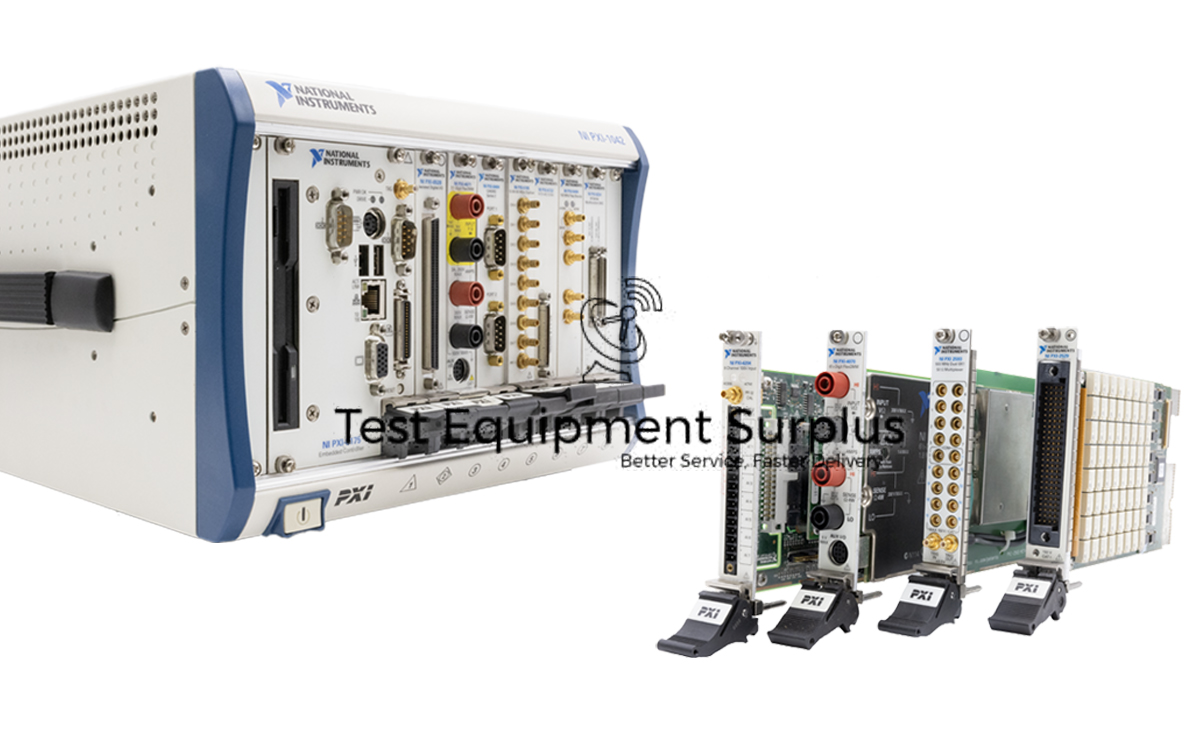Description
The National Instruments PXI-5651 PXI RF Analog Signal Generator, with the part number 779670-01, operates across a frequency range from 50 MHz to 3.3 GHz and offers exceptionally fine frequency steps that are typically 1 Hz or less. It is characterized by a low phase noise of -110 dBc/Hz at 1 GHz with a 10 kHz offset, ensuring high signal fidelity.
It supports various modulation types including FM, 2-FSK, and OOK, and can generate a diverse array of modulating waveforms such as sine, triangle, square, 31-stage PRBS, and user-defined 1020-bit sequences. The device’s Automatic Leveling Control (ALC) response spans a wide frequency range, typically from a few kilohertz to over 3.3 GHz, which aids in maintaining signal consistency.
The generator’s attenuation range boasts a typical scope of 100 dB, allowing for precise signal amplitude adjustments. Utilizing the NI-RFSG instrument driver, users can leverage the generator in a variety of applications, including stimulus response and tracking generator setups, among others.
| Specification | Detail |
|---|---|
| Product Name | National Instruments PXI-5651 PXI RF Analog Signal Generator |
| Part Number | 779670-01 |
| Frequency Range | 50 MHz to 3.3 GHz |
| Frequency Steps | Typically 1 Hz or less |
| Phase Noise | -110 dBc/Hz at 1 GHz, 10 kHz offset |
| Modulation Types | FM, 2-FSK, OOK |
| Modulating Waveforms | Sine, Triangle, Square, 31-stage PRBS, User-defined 1020-bit |
| Automatic Leveling Control (ALC) Response | Typically from a few kilohertz to greater than 3.3 GHz |
| Attenuation Range | Typical scope of 100 dB |
| Instrument Driver | NI-RFSG |
| Applications | Stimulus response, Tracking generator, etc. |
Question 1: What modulation types are supported by the National Instruments PXI-5651 PXI RF Analog Signal Generator, and what are the characteristics of its phase noise and frequency step precision?
Answer 1: The National Instruments PXI-5651 PXI RF Analog Signal Generator supports FM, 2-FSK, and OOK modulation types, and its specified phase noise is -110 dBc/Hz at a 1 GHz frequency with a 10 kHz offset.
Question 2: What modulation types can the National Instruments PXI-5651 PXI RF Analog Signal Generator support, and what is its specified phase noise at a 1 GHz frequency with a 10 kHz offset?
Answer 2: The National Instruments PXI-5651 PXI RF Analog Signal Generator supports modulation types such as FM, 2-FSK, and OOK, and is characterized by a low phase noise of -110 dBc/Hz at 1 GHz with a 10 kHz offset and offers exceptionally fine frequency steps of 1 Hz or less.
Question 3: What are the modulation capabilities and types of modulating waveforms that the National Instruments PXI-5651 PXI RF Analog Signal Generator can produce?
Answer 3: The National Instruments PXI-5651 PXI RF Analog Signal Generator, part number 779670-01, is distinguished by its wide frequency range of 50 MHz to 3.3 GHz with frequency steps of 1 Hz or less, supports modulation types such as FM, 2-FSK, and OOK with the ability to generate various modulating waveforms including sine, triangle, square, and custom sequences, and ensures signal consistency through its Automatic Leveling Control (ALC)
Question 4: What modulation types and modulating waveforms does the National Instruments PXI-5651 PXI RF Analog Signal Generator support, and what are its key features in terms of frequency range, phase noise, and attenuation range?
Answer 4: The National Instruments PXI-5651 PXI RF Analog Signal Generator supports modulation types such as FM, 2-FSK, and OOK and can generate modulating waveforms like sine, triangle, square, 31-stage PRBS, and user-defined 1020-bit sequences; its key features include a frequency range of 50 MHz to 3.3 GHz, a phase noise of -110 dBc/Hz at 1 GHz with a 10 kHz offset, and an attenuation
Question 5: What are the distinguishing features and capabilities of the National Instruments PXI-5651 PXI RF Analog Signal Generator, part number 779670-01, in terms of frequency range, modulation support, and signal consistency?
Answer 5: The National Instruments PXI-5651 PXI RF Analog Signal Generator can produce modulation types including FM, 2-FSK, and OOK, and it is capable of generating modulating waveforms such as sine, triangle, square, 31-stage PRBS, and user-defined 1020-bit sequences.




